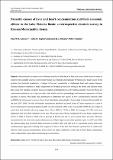Adherence; COVID-19; Control guidelines

View/
Publication Date
2012Author
Paul WN Kanyari, John M Kagira, Jumanne RL Mhoma, Peter Omemo
Metadata
Show full item recordAbstract/
Abstract. Malnutrition is a major cause of human mortality in Sub-Saharan Africa and every effort must be made to
conserve the available sources of protein for human use. Animals and especially livestock are a major source of the
proteins but livestock production is hampered by such constraints as inadequate feed and various diseases.
Parasitic diseases constitute a major impediment to livestock production owing to the direct and indirect losses
they cause. For example, in Kenya fasciolosis leads to estimated losses at ₤7 million annually. However, these are
conservative estimates since there are only a few studies on the epidemiology and economic importance of these
parasites in Kenya. This study was undertaken to determine the causes of liver condemnation between 2003
and2008 and subsequent economic losses from fasciolosis using slaughter house data in Kisumu Municipality for
the year 2007-2008. The role of muscular cysticercosis produced by larval forms of Taenia saginata as a cause of
heart condemnation among slaughtered cattle was also included in this study. During 2003-2008, the percentage of
cattle that had Fasciola infections ranged from 3% in 2003 to 7.13% in 2006. An average of 5.15% cattle was
diagnosed with liver fluke infections every year. The proportion of livers condemned for liver flukes ranged from
39.2% in 2005 to 52.4% in 2004 with an average of 46.9% over the six year period. Other parasitic infections
encountered in the liver were cystic echinococcosis, Stilesia hepatica and other parasitic cysts. In 2007 and 2008,
the total monetary loss from liver fluke infections was USD 12,034 and USD 13,413 respectively. Losses from heart
condemnations appeared relatively low compared to those of the liver but Muscular cysticercosis in cattle leads
often to whole carcass condemnation. These losses can make a difference in the Lake Victoria Basin communities
where malnutrition is prevalent and income per capita is low
